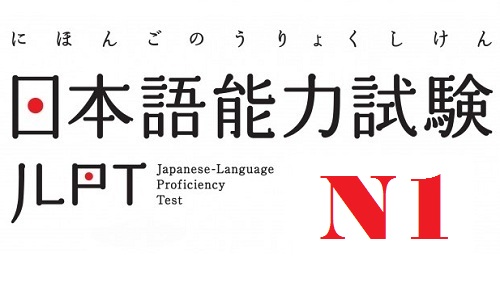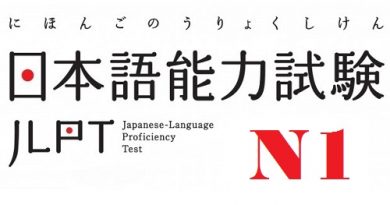Jlpt N1 vocabulary week 1
Jlpt N1 vocabulary week 1. To make it easier for you to study, Learn Japanese Online has collected Japanese N1 vocabularies from many sources. Each lesson contains 10 words (It’s a nice quantity for you to study regularly. The post is devided in to 6 days (or 1 week).
Contents
Tips for studying :
– Study regularly, do review in the next day, next 3 days and what you learnt in 1 week
– Note down difficult words that you spend all the week to study without result, then keep it with you to study anywhere
– You should imagine how the word is used in real life situation, make a sentence, or several other good ways in : How to learn Japanese.
– Determination and effort will help you to be successful !
Jlpt N1 vocabulary week 1
1. JLPT N1 Vocabulary day 1
1. 愛想(あいそう):amiability, friendliness, affability. Example : 店員の愛想のいい店 – A store with affable clerk.
2. 間柄 (あいだがら) : relationship. This word has a wider meaning than 続柄 (つづきがら – “ぞくがら), 続柄 refers to family relationship. Example : A社と弊社は昔から深い間柄がある. – Our company has a deep relationship with the company A. 親子の間柄 – Parent-child relationship.
3. あえて : purposely, daringly. Example : 言いにくいことを敢えて言おう – Let’s say purposely what is difficult to say.
4. あくどい : wicked, vicious. 彼は目的のためならどんなあくどい事でも平気でする人ですね. He is a guy who can do anything terrible for his purpose.
5. 痣 あざ. 痣は皮膚に現れる赤や青などの変色のこと : bruise, birthmark. A place where the skin changes color to red or blue. 青あざの正体は内出血です : Blue bruise is caused by internal bleeding.
6. あさましい : despicable, mean, shameful. Example : 浅ましい行為 – despicable act. この世の中、浅ましい奴が勝つ – In this world, despicable guys win.
7. 欺く あざむく : deceive, trick, fool. 視覚を欺く : trick eyes. 敵を欺く : fool the enemy. 人を欺く : deceive other people.
8. 焦る (あせる) : to be in a hurry. 焦る必要はないよ. You don’t have to be in a hurry. 褪せる (あせる). to fade, to discolor.
9. あっけない : disappointing, unsatisfying. あっけない勝利 : disappointing victory.
10. 誂える あつらえる : to place an order, to have made to order. 洋服を誂える : place an order for Western-style clothes
2. JLPT N1 Vocabulary day 2
11. 後回し : あとまわし : putting off, postponing. Example : やるべき事を後回しにしない方がいいよ. You shouldn’t postpone things that must be done.
12. あべこべ : contrary, opposite. It stands for あちらべこちらべ. Example : 負かすつもりであべこべに負けた. I was going to defeat him, but I was defeated.
13. 操る : あやつる – to operate, to control. 小舟を操る : control a small boat. 人形を操る : control a puppet.
14. 危ぶむ : あやぶむ : to fear, to worry about, to be anxious about. 成功を危ぶむ : worry about the success.
Example : 彼はそんなことを言ったら彼女の感情を害しはしまいかと危ぶんでいた
He is worrying that it can hurt her feelings if he says that.
15. あやふや : uncertain, vague. あやふやな答弁 : uncertain answer. あやふやな態度 : uncertain attitude.
16. 過ち : あやまち : fault. 過ちを犯す : make a mistake. たった一度の過ち : just one mistake
17. あらかじめ : beforehand, in advance. あらかじめ調べておく : check in advance. あらかじめ準備しておく : prepare in advance. 予めご了承下さい : Please note that…
18. 荒っぽい あらっぽい : wild, rude, violent. 荒っぽいバスの運転手 : rude bus driver. 荒っぽいことは俺たちがやる. We do rude things.
19. 有様 ありさま : state, condition. 事故の有り様 : the accident’s status. マスコミに事故の有り様をする : Convey the accident’s status through the mass media.
20. 有りのまま – ありのまま : as it is. 有りのままを見せる. Show it as it is. ありのままの自分 : the way I am
3. JLPT N1 Vocabulary day 3
21 . 有触れる (ありふれる) : to be common. Example : 有触れた恋のメロディー : A common melody of love. 有触れたる名を子供につける : give the child a common name.
22. 暗示(あんじ): hint, suggestion. Example : 触覚を利用して操作方法を暗示するタッチスイッチを開発した. develop a touch switch that uses tactile sensation to suggest the operation method. 死を暗示する花 : A flower that implies the death.
23. 案じる (あんじる). to be anxious, to be concerned about, to plan. Example : テストに出る問題を案じて準備した. I pondered and prepared for the questions that might be in the test.
24. いいかげん /いい加減 : reasonable. Example : 暑くもなく寒くもなく、ちょうどいい加減の気候になりましたね – It isn’t hot or cold, just a moderate climate, right?. But in normal usage, いいかげん is not 加減 “good”, it means “not very good”. Example : いい加減なやつ is a person who does not act properly. 試合に負けたのはいい加減な練習をしていたからだ : I lost the game because I didn’t practice enough.
25. 言い訳 (いいわけ). excuse, explanation. Example : それは言い訳だけだ。It’s just an excuse.
26. いかに. how, how much. Example その絵がいかに価値のあるものかを、彼女は知っていたのだろうか。I wonder if she knows how valuable that picture is. いかに考えてみても、みずからそれを説明することができなかった : No matter how I try to think, I can’t explain that by myself.
27. いかにも. indeed, really, very. いかにも悲しげな顔. A face that looks very sad.
28. いきな : stylish, tasteful. たまに見かける粋な人 : A stylish person can be seen sometimes.
29. 生きがい ikigai : reason for living, purpose in life. 生きがいが無いあなたは幸せではない、生きがいがあるから私は幸せだ : You don’t have a purpose in life, so you won’t be happy. I have a purpose in life, so I’m happy.
30. 案の定(あんのじょう): just as one thought, as expected. 彼らは案の定失敗した : Just as I thought, they failed. 案の定 叱られました : Just as I thought, I was scolded.
4. JLPT N1 Vocabulary day 4
31. 幾多 いくた : many, numerous. 幾多の困難を切り抜けた : got over a lot of difficulties. 幾多の恩に 助けられ 生きて来た. Thanks to a lot of favors, I’ve been alive.
33 依然 いぜん/ 依然として : still, as it has been. Example : 依然同様の管理です : The same management as before. 現在、投資用不動産の価格は依然として上昇傾向にあります. Currently, the price of investment property still tends to increase as before. 中小企業在庫は依然増加傾向を続けた : Inventories of small and medium companies still continue to increase.
34 いたって : very much, extremely. いたって普通 : very normal. いたって簡単なこと : A very simple thing. It is different from 至って (いたって):to arrive at, to reach.
35 一概に いちがいに : unconditionally, as a rule. どちらがいいか一概にはいえないようだ : Can’t say unconditionally which is good. 日本人って、たいていお金持ちでしょう。 いや、「 それは一概に言えません 」よ : Japanese people are usually rich, right? No, you can’t say it unconditionally.
36 一同 いちどう : all present, all concerned, all of us. Example : 新年にあたり社長は社員一同へのメッセージを送られた。The manager sent a message to all employees in the new year. スタッフ一同、笑顔でお客様をお迎えします : All staff welcome customers with a smile.
37 一目 いちもく/ひとめ : glance, look. Example : 一目して状況を把握する : take a look to to grasp the situation. 一目して明らかだ : it’s obvious at a glance. 一目ぼれ : love at first sight. 一目惚れした女性へのアプローチ : approach the girl I love at first sight.
38 一様 いちよう : the same, uniform. Example : 一様に白い靴を履いている. Everyone wear white shoes at the same time.
39 一律 いちりつ : uniform, even, equal. Example : 一律な速度 : uniform speed. 一律 7%の昇給 : a 7% rise in salary. 全国一律料金. 日本全国一律164円です : The fee is the same all over the country. It costs 164 yen all over Japan.
40 一連 いちれん : series, chain. 一連の放火事件 : a series of arson incidents. 一連の行動 : a series of actions. 一連の出来事 : a series of events.
5. JLPT N1 Vocabulary day 5
41. 一括 – いっかつ : lumping together, summing up. Example : 一括して購入する : buy in bulk. 書類を一括して送る : send documents in bulk.
42. 一気 – いっき : one breath. 一気飲み : chugging (a glassful of) a drink in one go.
43. 一挙 – いっきょ : one effort, one action. 一挙無料配信 : free delivery once. 一挙放送 : transmitting sequential episodes of a radio or television series.
44. 一心 – いっしん : one mind. 一心不乱 : wholeheartedly. 大企業と契約したい一心で、その件で安易に妥協するのは問題だ : It’s a problem when you wholeheartedly want to sign a contract with a large company so you compromise with that condition easily.
45. いっそ : rather, preferably. Example : そんな絵ならいっそ掛けないほうがましだ. I would rather not hang a picture like that.
46. 一変 – いっぺん : complete change, about-face. 転職することで生活環境は一変する : Because of changing job, the living environment has completely changed.
47. 意図 – いと : intention, aim. 相手の意図をくむ : understand partner’s intention. 敵の意図を見抜く : see into enemy’s intention.
48. いびき – : snore. いびきをかくのは男性というイメージがありますが、実際のところはそうではありません : Snoring makes people think of men, but in reality, it is not true.
49. いまさら – : at this late hour (i.e. it is too late for something). いまさら知った大発見 (自分だけ知らなかった常識) : great discovery that I knew after such a long time (Common knowledge that only I don’t know).
50. いまだ – : still, not yet.いまだはっきりしない事故原因 : The cause of the accident is still unclear.
6. JLPT N1 Vocabulary day 6
51 . いやいや
Japanese dictionary : しかたなく物事を行うさま。嫌だとは思いながら
Meaning : unwillingly, reluctantly
Example : 嫌嫌承知する. Accept something reluctantly.
52 . いやに
Japanese dictionary : 状態が異常であるさま
Meaning : awfully, terribly
Example : 何だかいやに静かな晩だ. It’s a very quiet night.
53 . 陰気(いんき)
Japanese dictionary : 気分・雰囲気・天候などが、晴れ晴れしないこと
Meaning : gloomy, dismal
Example : なんとなく陰気な人. A person who is gloomy for some reason. 陰気な会 : A gloomy meeting.
54 . 受け止める(うけとめる)
Japanese dictionary : 自分の方に向かってくるものを支えて、その進行や攻撃を止める
Meaning : to catch, to stop the blow
Example : ボールを受け止める. Catch the ball.
55 . 打ち明ける (うちあける)
Japanese dictionary : 人に知られたくない事実や秘密などを、思い切って隠さずに話す
Meaning : to reveal, to open (one’s heart)
Example : 思いのたけを打ち明けるう. Open my heart to express my thoughts.
56 . 打ち切る(うちきる)
Japanese dictionary : 物事を中途でやめにする。中止する
Meaning : to stop, to abort, to discontinue
Example : 交渉はこれで打ち切る. The negotiation will stop here.
57 . 打ち込む(うちこむ)
Japanese dictionary : その事に全精力を注ぐ。熱中する。夢中になる。
Meaning : to devote oneself to, to throw oneself into, to go heart and soul into
Example : 仕事に打ち込む. I throw myself into work.
58 . 内訳(うちわけ)
Japanese dictionary : 金銭の総額、物品の総量に対し、その内容を項目別に書き記すこと
Meaning : itemization
Example : 友達旅行費用の内訳を教えてもらった。My friend show me the breakdown of travel expenses.
59 . うっとうしい
Japanese dictionary : 気分が重苦しい
Meaning : gloomy, depressing
Example : 難題をかかえてうっとうしい気分だ. Feeling depressed with many difficult challenges.
60 . うつむく
Japanese dictionary : 下を向く
Meaning : to cast one’s eyes downward, to look down
Example : 恥ずかしげにうつむく. Look down shyly.
Above is Jlpt N1 vocabulary week 1. Learn the following weeks in the category : JLPT N1 Vocabulary.
Good luck !
